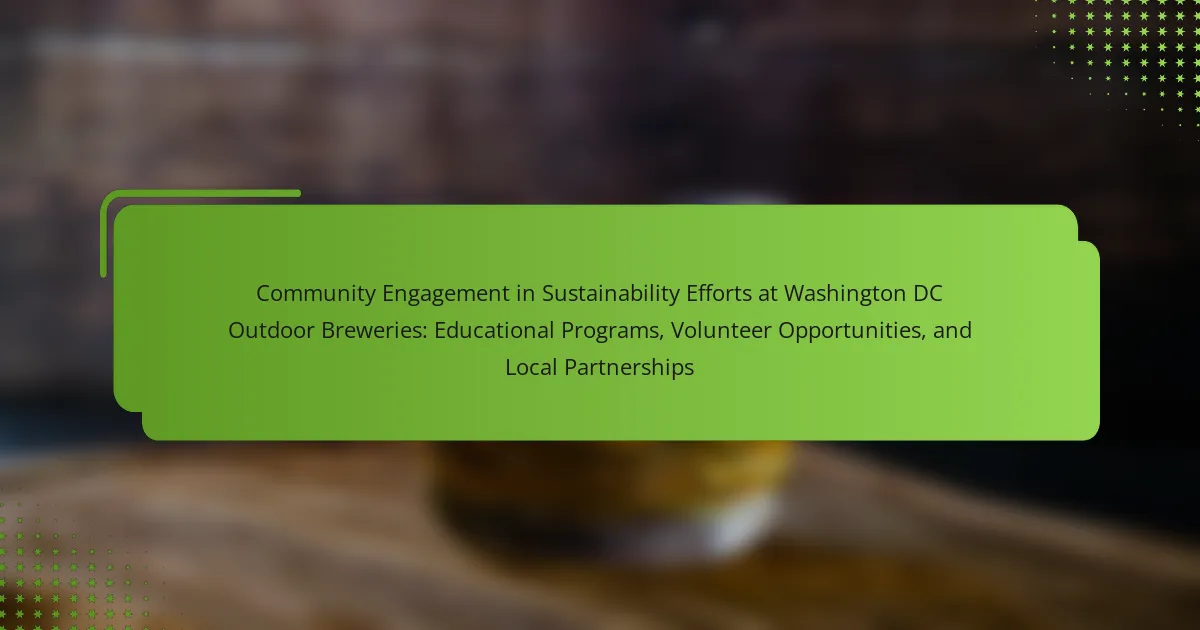Washington DC outdoor breweries actively engage with local communities to promote sustainability through educational programs, volunteer opportunities, and partnerships. These breweries implement initiatives that inform the public about sustainable practices, offering hands-on experiences such as event assistance and environmental projects like tree planting. Collaborations with local farmers and environmental organizations enhance these sustainability efforts, fostering a culture of shared responsibility for environmental stewardship. By creating a network of community involvement, these breweries contribute to increased awareness and improved sustainability ratings within the industry.

What is Community Engagement in Sustainability Efforts at Washington DC Outdoor Breweries?
Community engagement in sustainability efforts at Washington DC outdoor breweries involves active participation and collaboration with local communities. These breweries implement educational programs to inform the public about sustainable practices. They also create volunteer opportunities for community members to participate in sustainability initiatives. Local partnerships with environmental organizations enhance these efforts. By engaging the community, breweries promote awareness and foster a culture of sustainability. This approach leads to shared responsibility for environmental stewardship among residents and businesses.
How do outdoor breweries in Washington DC contribute to sustainability?
Outdoor breweries in Washington DC contribute to sustainability through eco-friendly practices and community engagement. They often utilize renewable energy sources, such as solar panels, to power their operations. Many breweries implement water conservation techniques, reducing waste and preserving local water resources. They also source ingredients locally, which minimizes transportation emissions and supports local agriculture.
Additionally, outdoor breweries frequently host educational programs to raise awareness about sustainability. These programs teach the community about responsible consumption and environmental stewardship. Volunteer opportunities are often provided, allowing patrons to participate in local clean-up efforts or conservation projects.
Furthermore, partnerships with local environmental organizations enhance their sustainability initiatives. By collaborating with these groups, breweries can amplify their impact on the community and the environment. Overall, outdoor breweries in Washington DC play a significant role in promoting sustainable practices and fostering community involvement.
What are the key sustainability practices implemented by these breweries?
Key sustainability practices implemented by these breweries include water conservation, waste reduction, and sourcing local ingredients. Many breweries utilize water recycling systems to minimize water usage during brewing. They also implement composting programs to reduce waste sent to landfills. Additionally, local sourcing supports regional agriculture and reduces transportation emissions. Some breweries engage in energy-efficient brewing processes to lower their carbon footprint. Furthermore, educational programs raise awareness about sustainability among consumers and the community. These practices collectively contribute to a more sustainable brewing industry.
How do these practices impact the local environment?
Community engagement practices at Washington DC outdoor breweries positively impact the local environment. These practices promote sustainable brewing methods that reduce waste and conserve resources. Educational programs raise awareness about environmental issues and encourage responsible consumption. Volunteer opportunities lead to hands-on conservation efforts, such as clean-up events and tree planting. Local partnerships facilitate resource sharing and collaborative projects that enhance biodiversity. Research shows that community involvement in sustainability can improve local ecosystems and foster a sense of stewardship among residents. These combined efforts contribute to a healthier environment and a stronger community connection.
Why is community engagement important for sustainability efforts?
Community engagement is crucial for sustainability efforts because it fosters collaboration and shared responsibility. Engaged communities are more likely to support and participate in sustainable practices. This involvement leads to innovative solutions tailored to local needs. According to a study by the International Journal of Sustainability in Higher Education, community engagement enhances environmental awareness and action. It also builds trust between stakeholders, leading to more effective and lasting initiatives. Engaging the community ensures diverse perspectives are included, improving decision-making. Overall, active participation drives successful sustainability outcomes.
How does community involvement enhance sustainability initiatives?
Community involvement enhances sustainability initiatives by fostering local ownership and accountability. Engaged communities are more likely to support and maintain sustainable practices. They contribute valuable local knowledge that can inform effective strategies. Participation in sustainability efforts often leads to increased awareness of environmental issues. This awareness can drive behavioral changes that promote sustainability. Collaborative projects can also leverage community resources for greater impact. Moreover, strong community ties can facilitate partnerships with local organizations. These partnerships often result in more successful and enduring sustainability outcomes.
What role do local residents play in these efforts?
Local residents are crucial to sustainability efforts at Washington DC outdoor breweries. They participate in educational programs that raise awareness about environmental issues. Residents also engage in volunteer opportunities, helping with clean-up initiatives and conservation projects. Their involvement fosters a sense of community and strengthens local partnerships. Studies show that community participation enhances the effectiveness of sustainability programs. For example, local residents contributed to a 30% increase in recycling rates at participating breweries. Their feedback helps shape future initiatives, ensuring they meet community needs.
What types of educational programs are offered by Washington DC outdoor breweries?
Washington DC outdoor breweries offer a variety of educational programs focused on sustainability and brewing processes. These programs include brewing workshops that teach participants about the fermentation process and ingredient selection. Additionally, many breweries provide farm-to-table tours that highlight local sourcing and sustainable practices. Educational events often feature guest speakers from the brewing industry, discussing topics like environmental impact and innovation. Some breweries also host community events that promote awareness of sustainable practices in brewing. These programs aim to engage the community and foster a deeper understanding of the brewing process and sustainability efforts.
What topics are covered in these educational programs?
The educational programs cover topics related to sustainability practices in brewing. They include waste reduction strategies, water conservation techniques, and energy efficiency methods. Participants learn about local sourcing of ingredients and the importance of biodiversity. Programs also address community impact and the role of breweries in local economies. Workshops focus on environmental stewardship and responsible consumption. These topics aim to enhance awareness of sustainable practices within the brewing industry.
How are these programs structured to engage the community?
These programs are structured to engage the community through interactive educational initiatives and hands-on volunteer opportunities. They offer workshops that educate participants about sustainable brewing practices. Local breweries collaborate with community organizations to host events that promote environmental awareness. Volunteer opportunities allow community members to participate in conservation projects. These activities foster a sense of ownership and responsibility towards local resources. Partnerships with schools and non-profits enhance outreach and participation. Surveys indicate increased community involvement when programs are tailored to local interests. Overall, the structure is designed to create a responsive and inclusive community engagement framework.

What volunteer opportunities are available at Washington DC outdoor breweries?
Washington DC outdoor breweries offer various volunteer opportunities. These include assisting with events, such as beer festivals and community clean-ups. Volunteers can help with tasks like setting up, serving, and breaking down events. Some breweries also provide opportunities for environmental initiatives, such as tree planting or recycling programs. Additionally, volunteers may engage in educational programs about brewing and sustainability practices. Specific breweries may have unique initiatives, so checking their websites or contacting them directly is recommended for current opportunities.
How can community members get involved in volunteer efforts?
Community members can get involved in volunteer efforts by participating in organized events at local breweries. These breweries often host clean-up days, educational workshops, and sustainability initiatives. Interested individuals can check the breweries’ websites or social media for announcements about upcoming volunteer opportunities. Many breweries collaborate with local environmental organizations, providing additional avenues for engagement. Volunteers can also sign up for newsletters to receive updates on events and programs. Participation in these efforts supports community sustainability and fosters connections among residents. Engaging in volunteer activities can enhance local ecosystems and promote environmental awareness.
What specific tasks do volunteers typically undertake?
Volunteers typically undertake tasks such as organizing events, conducting educational workshops, and participating in clean-up activities. They assist in planting trees and maintaining green spaces. Volunteers also help with data collection for environmental research. In Washington DC outdoor breweries, they may engage in promoting sustainable practices. Additionally, volunteers often support local partnerships by collaborating with community organizations. These tasks contribute significantly to sustainability efforts and community engagement.
What benefits do volunteers gain from participating?
Volunteers gain several benefits from participating in community engagement activities. These benefits include skill development, social connections, and enhanced well-being. Volunteers often acquire new skills relevant to sustainability and environmental practices. They also build relationships with like-minded individuals, fostering a sense of community. Participation in volunteer activities has been linked to improved mental health. Studies show that volunteering can reduce stress and increase happiness. Furthermore, volunteers contribute to meaningful projects that positively impact the environment. This engagement cultivates a sense of purpose and fulfillment.
What challenges do outdoor breweries face in engaging the community?
Outdoor breweries face several challenges in engaging the community. Limited space can restrict the number of events and activities they can host. Weather conditions also impact outdoor gatherings, making attendance unpredictable. Additionally, competition from other local venues can dilute community interest. Regulatory hurdles may complicate event planning and execution. Communication barriers can arise if breweries do not effectively reach their target audience. Lastly, a lack of resources for marketing and outreach can hinder engagement efforts. These factors collectively challenge outdoor breweries in fostering strong community connections.
How do these challenges affect sustainability initiatives?
Challenges in community engagement directly hinder sustainability initiatives. Limited participation reduces the effectiveness of educational programs. Low volunteer turnout impacts resource availability for sustainability projects. Lack of local partnerships diminishes collaborative efforts and shared resources. These factors result in slower progress towards sustainability goals. According to a 2021 study by the Environmental Protection Agency, community involvement is crucial for successful sustainability outcomes. Without addressing these challenges, initiatives may struggle to achieve their intended impact.
What strategies are employed to overcome these challenges?
Community engagement strategies employed to overcome challenges include educational programs, volunteer opportunities, and local partnerships. Educational programs raise awareness about sustainability practices. They inform the community about environmental impacts and benefits. Volunteer opportunities encourage participation in hands-on sustainability initiatives. These initiatives foster a sense of ownership and responsibility among community members. Local partnerships enhance resource sharing and collaboration. They connect breweries with environmental organizations and local governments. These strategies collectively address challenges by promoting active involvement and informed decision-making.

How do local partnerships enhance sustainability efforts at outdoor breweries?
Local partnerships enhance sustainability efforts at outdoor breweries by providing resources and expertise. Collaborating with local farmers ensures access to sustainable ingredients. This reduces transportation emissions and supports the local economy. Partnerships with environmental organizations facilitate educational initiatives. Such initiatives raise awareness about sustainable practices among consumers. Furthermore, joint community events promote recycling and waste reduction. Studies show that breweries engaged with local entities see higher sustainability ratings. These collaborations create a network of shared goals focused on environmental stewardship.
What types of local partnerships exist in Washington DC’s brewing community?
Local partnerships in Washington DC’s brewing community include collaborations with local farms, restaurants, and nonprofit organizations. These partnerships often focus on sustainability and community engagement. Breweries work with local farms to source ingredients like hops and grains. They also partner with restaurants to create unique food and beer pairings. Nonprofits often collaborate with breweries for community events and fundraising efforts. For example, some breweries host events that support environmental initiatives. These partnerships enhance the local economy and promote sustainable practices within the brewing industry.
How do these partnerships contribute to sustainability goals?
Partnerships contribute to sustainability goals by fostering collaboration and resource sharing. They enable breweries to implement eco-friendly practices collectively. These collaborations often lead to joint initiatives such as community clean-up events and educational workshops. For instance, breweries may partner with local environmental organizations to promote recycling and waste reduction. Such efforts can significantly reduce the carbon footprint of operations. Additionally, partnerships can enhance community awareness and involvement in sustainability issues. Engaging local stakeholders creates a shared responsibility for environmental stewardship. This collaborative approach strengthens the impact of sustainability initiatives in the community.
What are some successful examples of local collaborations?
Successful examples of local collaborations include partnerships between Washington DC outdoor breweries and local farms. These collaborations often focus on sourcing ingredients sustainably. For instance, breweries like DC Brau have worked with local farms to obtain fresh hops and grains. This reduces transportation emissions and supports the local economy. Additionally, breweries often host community events with local environmental organizations. Such events raise awareness about sustainability practices. Collaborations also extend to educational programs for the community. These programs teach participants about sustainable brewing practices and environmental stewardship. Overall, these partnerships enhance community ties and promote sustainability in the region.
How can community members foster stronger partnerships with breweries?
Community members can foster stronger partnerships with breweries by engaging in collaborative projects. These projects can include organizing local events that promote both the brewery and community initiatives. Additionally, community members can volunteer for brewery-sponsored events, which builds mutual support and understanding. Regular communication between community groups and breweries is essential for identifying shared goals. Community members can also provide feedback on brewery practices, helping to align sustainability efforts. Establishing local business networks can further enhance these partnerships. By supporting local breweries, community members contribute to a thriving local economy. This collaborative approach benefits both the community and the breweries involved.
What steps can individuals take to engage with local breweries?
Individuals can engage with local breweries by attending events and tastings. Many breweries host regular events that showcase their products. Joining brewery tours provides insight into their brewing processes. Participating in volunteer opportunities helps support local initiatives. Following breweries on social media keeps individuals informed about new offerings. Engaging in community events fosters connections with brewery staff and other patrons. Collaborating with local organizations enhances sustainability efforts. Supporting local breweries through purchases contributes to their growth and community impact.
How can partnerships lead to more effective sustainability practices?
Partnerships can lead to more effective sustainability practices by combining resources and expertise. Collaborating entities can share knowledge, which enhances innovation in sustainable solutions. For instance, breweries partnering with environmental organizations can implement best practices in waste management. Joint initiatives can increase community engagement and awareness of sustainability issues. This collaboration often results in greater funding opportunities for sustainability projects. Evidence shows that businesses involved in partnerships are more likely to adopt sustainable practices. A study by the World Resources Institute highlights that collaborative efforts can reduce carbon footprints significantly. Thus, partnerships are pivotal in driving effective sustainability practices.
What best practices should outdoor breweries follow for effective community engagement?
Outdoor breweries should prioritize transparency and open communication for effective community engagement. This involves regularly sharing information about their sustainability efforts and community initiatives. Hosting community events fosters relationships and encourages local participation. Collaborating with local organizations enhances credibility and expands outreach. Providing educational programs about brewing and sustainability can inform and inspire community members. Offering volunteer opportunities allows locals to contribute directly to brewery initiatives. Collecting feedback from the community helps breweries understand local needs and preferences. Engaging on social media platforms increases visibility and interaction with the community. These practices create a positive impact and strengthen community ties.
How can breweries measure the success of their engagement efforts?
Breweries can measure the success of their engagement efforts through various metrics. They can track attendance at events and programs. Increased participation indicates effective engagement. Surveys can be utilized to gather feedback from participants. Positive responses reflect successful outreach and connection. Social media engagement metrics also provide insight. Higher likes, shares, and comments show increased community interaction. Partnerships with local organizations can be evaluated through collaborative outcomes. Successful projects demonstrate effective community engagement. Lastly, sales data can indicate the impact of engagement efforts on customer loyalty. Increased sales following events suggest successful engagement initiatives.
What resources are available to support community engagement initiatives?
Community engagement initiatives can be supported by various resources. These include educational programs offered by local breweries that focus on sustainability practices. Volunteer opportunities allow community members to participate actively in environmental efforts. Local partnerships with organizations enhance outreach and collaboration. Funding from grants and donations can also provide financial support for these initiatives. Additionally, online platforms and social media serve as tools for communication and awareness. Access to research and case studies can inform best practices for engagement.
Community engagement in sustainability efforts at Washington DC outdoor breweries focuses on collaboration with local communities through educational programs, volunteer opportunities, and partnerships with environmental organizations. These breweries implement eco-friendly practices, such as water conservation and local sourcing, while promoting awareness and participation in sustainability initiatives. Key practices include hosting workshops and clean-up events that enhance community involvement and foster a culture of environmental stewardship. The article explores the impact of these efforts on local ecosystems and the importance of community participation in achieving sustainability goals.
